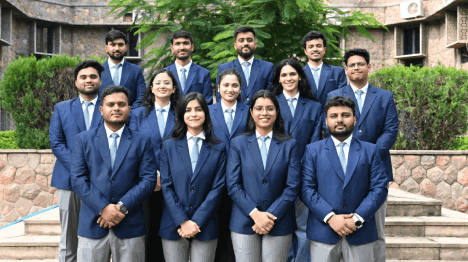- About Us
-
Academics
Schools
Programs
General Information
-
Faculty
The faculty members and researchers working at IIHMR University come from varied backgrounds including, but not limited to medicine, public health, management, economics, statistics, demography, human geography, social and behavioral sciences, rural development and pharmaceuticals.
-
Admissions
- Research
Publications & Journal
- Executive Education
Executive Programmes
- Online Certification Courses
ONLINE CERTIFICATION Courses
- Training
- Placements
- Contact
- Pradanya
- Blog
- Fee Payment
- NAAC
- IQAC
- NIRF
-
About Us
- About IIHMR University
- Board of Management
- Academic Council
- Board of Studies
- Research Board
- Institutional Review Board
- Finance & Audit Committee
- Departmental Research Committee
- Chairperson's Message
- President's Message
- IIHMR University Act
- Infrastructure
- Collaboration
- Ranking
- Board of Studies (School of Digital Health)
- Awards & Accolades
-
Academics
- Institute of Health Management Research
- School of Pharmaceutical Management
- ML Mehta School of Development Studies
- School of Digital Health
- SD Gupta School of Public Health
- MBA (Hospital and Health Management)
- MBA (Pharmaceutical Management)
- MBA (Development Management)
- MBA (Healthcare Analytics)
- Master of Public Health
- Student Manual – Cohort 9 (2021-2023)
- Master of Public Health (Offered by Johns Hopkins Bloomberg School of Public Health, USA in cooperation with IIHMR University, Jaipur, India)
- Ph. D.
- MBA CSR & ESG Management (Executive)
- MBA Sustainable Business Management (Executive)
- Common Information for all the Programs
- Academic Calendar
- Student Handbook 2020-21
- Committees
- Policies
- Annual Exam Calendar
- Library
- Faculty
- Officers of University
- Dean of Institute of Health Management Research
- Dean of School of Pharmaceutical Management
- Dean of School of Development Studies
- Dean of SD Gupta School of Public Health
- Dean of School of Digital Health
- School of Digital Health
- Faculty List A to Z
- Faculty List Designation Wise
- Faculty List School Wise
- Admissions
- Research
- Executive Education
- Training
- Placements
- Alumni
- Events
- Job Openings
- Contact
- Research
Baseline Survey of Adolescent Girl’s Initiative (AGI) in Selected Blocks of Udaipur District, Rajasthan
Agency : UNFPA
The SABLA programme of the Directorate of Women Empowerment, Government of Rajasthan in collaboration with the UNFPA is contemplating implementation of the Adolescent Girls Initiatives intervention in one of the blocks of Udaipur district in Rajasthan. A baseline survey was conducted with the objectives of: (i) establishing benchmark on key indicators related to knowledge, attitudes and practices among adolescent girls on issues related to their health and well being, which will be compared as measure of success of the project after completion of the interventions; (ii) to provide situational analysis of the current status of adolescent girls; and (iii) to exploring perspectives of the key stakeholders towards adolescents in the project area. The survey was conducted in two blocks: the intervention (Salumber), and control (Gogunda) in Udaipur during September and October 2014. The first phase included listing of houses where adolescent girls in two age groups (10-14; and 15-19 years) were present. During the survey 465 (94.5 percent of the proposed) and 453 (92.1 percent of the proposed) adolescent girls in 10-14 years and 15-19 years were interviewed respectively in the intervention block. The key findings based on data gathered, using both quantitative and qualitative methods, reflected that there was lack of awareness related to adolescent health and changes related to puberty, family planning, spacing methods and STIs. The study also indicated that, although their awareness and practice related to personal hygiene was high, the myths and misconceptions related to menstrual practices also abound. About half of the respondents could recall substance abuse related consequences like lung cancer but awareness relating to HIV/AIDS was abysmally low. Legal and financial literacy was very low and most of the respondents did not even respond to the issue of domestic violence. The respondents were reported to be dependent on others for decisions and even socio-political empowerment and participation was very low.
The girls suffered from gender discrimination and gender-based emotional/ psychological violence and, therefore, importance of group membership is necessary to raise the collective voice. It was recommended that the intervention may focus on building skills of girls as well as key stakeholders to fulfil their daughters’ dreams.



